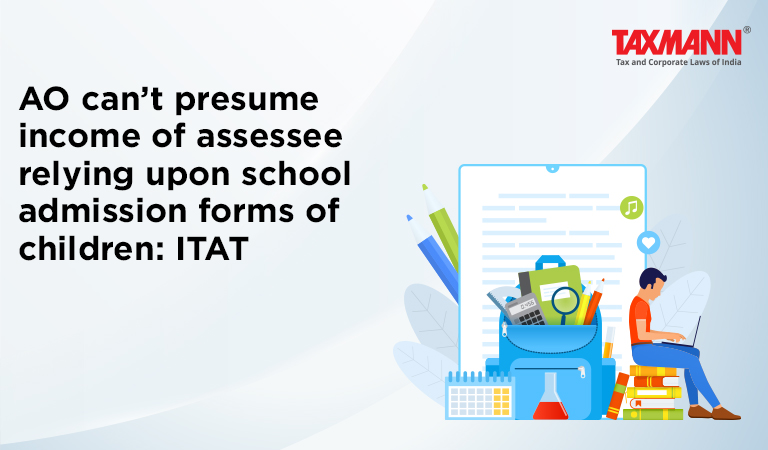AO can’t Presume Income of Assessee Relying upon School Admission Forms of Children: ITAT
- Blog|News|Income Tax|
- 2 Min Read
- By Taxmann
- |
- Last Updated on 5 May, 2023

Case Details: Bharatbhai Manubhai Baldha v. DCIT - [2023] 150 taxmann.com 66 (Surat-Trib.)
Judiciary and Counsel Details
-
- Pawan Singh, Judicial Member and DR. Arjun Lal Saini, Accountant Member
- Mitish Modi and Akshay Modi, CA for the Assessee.
- Ashok B. Koli, CIT-DR for the Revenue.
Facts of the Case
Assessee was an individual who filed his return of income declaring the amount of Rs. 2.64 lakh. A search action was carried out on the residence of the assessee. In the statement recorded under section 132(4), the assessee stated that his household expenses and education expenses of two kids were Rs. 14 lacks, which his younger brother bears.
To verify such claim, AO issued a notice under section 133(6) to G D Goenka School to furnish admission form, fee paid by the assessee and bifurcation thereof. On perusal of the school form, the AO noted that in the school admission form, the assessee had mentioned his monthly income as Rs. 4.00 lakhs per month.
Further, the assessee and his wife signed a declaration wherein they certified that the information given in the admission form was true to their knowledge and belief for incorrect information supplied in the admission form jeopardized selection and enrolment.
Thus, AO took his view that the assessee was having annual income of Rs. 48.00 lakhs per annum and made additions under section 69A.
ITAT Held
On appeal, the CIT(A) upheld the additions made by the AO. Aggrieved-assessee filed the instant appeal before the Tribunal.
The Tribunal held that AO estimated the assessee’s income solely on the school admissions form of his children, wherein the assessee filled up his monthly income of Rs. 4.00 lakhs per month. The assessee explained that the entry on the school admission form was made only to secure the admission of his children.
In the search proceedings, no tangible material or evidence was found that the assessee had unaccounted income. AO made additions solely relying upon the information gathered from the school under section 133(6), which was also gathered at the back of assessee.
Under the law, it is a settled position that only real income accrued or earned by an individual can be brought to tax, and there is no place for any presumption.
Thus, the appeal was restored back to the file of AO with the direction to grant the opportunity to the assessee to explain the nature and relevance of the school admission form and to lead any other evidence, if so desired by the assessee to disprove the contents of such school admission form.
Disclaimer: The content/information published on the website is only for general information of the user and shall not be construed as legal advice. While the Taxmann has exercised reasonable efforts to ensure the veracity of information/content published, Taxmann shall be under no liability in any manner whatsoever for incorrect information, if any.

Taxmann Publications has a dedicated in-house Research & Editorial Team. This team consists of a team of Chartered Accountants, Company Secretaries, and Lawyers. This team works under the guidance and supervision of editor-in-chief Mr Rakesh Bhargava.
The Research and Editorial Team is responsible for developing reliable and accurate content for the readers. The team follows the six-sigma approach to achieve the benchmark of zero error in its publications and research platforms. The team ensures that the following publication guidelines are thoroughly followed while developing the content:
- The statutory material is obtained only from the authorized and reliable sources
- All the latest developments in the judicial and legislative fields are covered
- Prepare the analytical write-ups on current, controversial, and important issues to help the readers to understand the concept and its implications
- Every content published by Taxmann is complete, accurate and lucid
- All evidence-based statements are supported with proper reference to Section, Circular No., Notification No. or citations
- The golden rules of grammar, style and consistency are thoroughly followed
- Font and size that’s easy to read and remain consistent across all imprint and digital publications are applied



 CA | CS | CMA
CA | CS | CMA
